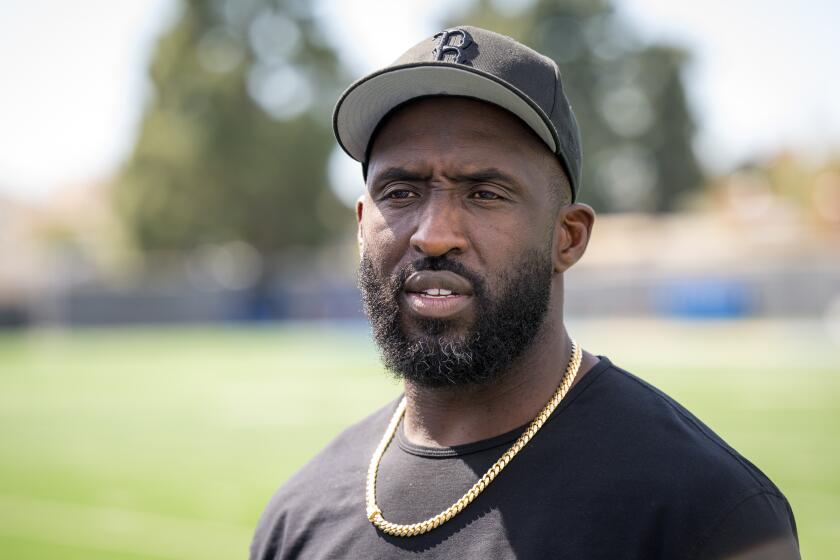When Credibility Becomes an Issue, Then It’s Good
- Share via
The credibility of women’s college basketball is under attack, which in a perverse sense is an encouraging sign for women’s college basketball. In the not-so-distant past, most people didn’t care enough about it to question its credibility.
It was apparent that attitude had changed last month, when Connecticut’s injured Nykesha Sales inflamed passions by scoring an uncontested basket for a school record.
Now UCLA loses an NCAA tournament game on a last-second shot to Alabama, at Alabama, after Alabama’s timekeeper fails to start the clock, producing one of the most unjust results in tournament history--men’s or women’s.
I was far less offended by Sales’ gimme. If I had a daughter who played basketball, I’d feel extremely comfortable about her playing for Connecticut Coach Geno Auriemma. His gesture showed he cares less about the game than the people who play it.
At the same time, I was concerned it might be misinterpreted to mean there are different standards for men and women. In fact, it was misinterpreted by many, most outrageously by the Big East Conference commissioner.
“It’s a women’s sport; this was a female basketball player,” Mike Tranghese said, explaining his approval of Sales’ basket. “I am a man. I am not going to pretend to handle decisions on men and women exactly the same way.”
In other words, you haven’t come such a long way after all, baby.
*
That was obvious again last week in comparing the men’s and women’s NCAA tournament brackets.
No men’s teams were required to play games in the first or second rounds on an opponents’ home court because of the blatant unfairness of it. Duke Coach Mike Krzyzewski yelped because his team had to play on Kentucky’s home court, and Kentucky wasn’t even playing there.
Yet, playing at an opponents’ home apparently was deemed less unfair for women. Several teams had to do it.
UCLA’s reward for winning its opening game against Michigan was a second-round game Sunday night against Alabama in Tuscaloosa, where the Crimson Tide had won 30 of its previous 31 games.
“The good Lord just blessed us,” Alabama Coach Rick Moody said after making it 31 of 32 with a 75-74 victory over the Bruins.
No, you were blessed because a timekeeper who has been at Alabama since before anyone ever heard of Bear Bryant failed to start the clock when the ball was touched on an inbounds play.
According to an ESPN report Monday, the Crimson Tide was allowed three seconds to run off the final 0.8 of a second showing on the clock, giving them enough time to score the winning basket.
It’s only fair to add that the timekeeper would have had no influence on the outcome if the officials hadn’t made an equally egregious error by failing to call Alabama’s Brittney Ezell for moving along the end line before throwing the inbound pass.
*
Jean Lenti Ponsetto, an honorable woman who heads the NCAA’s Division I Women’s Basketball Committee, all but apologized to UCLA in a statement Monday.
“Basketball games are not played in a vacuum,” Ponsetto said. “Human beings are involved, and human beings make mistakes. When that happens, the results can be calamitous to the losing team.
“All of us who have spent our lives in sports know that and can empathize with the UCLA coaches and players.”
She also announced that the officials won’t work tournament games again this season.
As proper as that sounds, it solves nothing.
No matter how inept the officials were Sunday in handling the final second, no one questioned whether they were biased toward the home team.
That was not the case with timekeeper Doc Blanchard, who is paid by the home team. Even if he is the most honest man in Alabama, and there’s no evidence that he’s not, it’s only natural to question whether he has a slow trigger finger when it suits the Crimson Tide.
The NCAA needs to reconsider whether it is any more appropriate to award a home-court advantage in the tournament to a women’s team than a men’s team. In the past, officials have explained their contrasting approaches to the tournaments as an issue of finances, not gender.
They might also point out today that the home-court advantage hasn’t been much of one in this tournament. Harvard won at Stanford, Notre Dame at Texas Tech and Kansas at Iowa.
But that does little to appease UCLA, which should have won at Alabama.
Considering the revenue the men’s tournament generates, the NCAA no doubt could afford neutral sites for the women’s teams.
Or at least neutral timekeepers.
More to Read
Go beyond the scoreboard
Get the latest on L.A.'s teams in the daily Sports Report newsletter.
You may occasionally receive promotional content from the Los Angeles Times.






